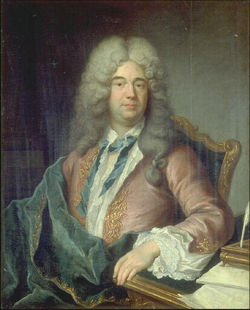Jean-Baptiste Rousseau facts for kids
Jean-Baptiste Rousseau (born April 6, 1671 – died March 17, 1741) was a famous French playwright and poet. He was especially known for his short, clever, and sometimes critical poems called epigrams.
Contents
Early Life and Start in Writing
Jean-Baptiste Rousseau was born in Paris. His father was a shoemaker, but Jean-Baptiste received a good education. When he was young, a well-known writer named Boileau liked his work. Boileau encouraged him to write.
Rousseau first tried writing for the theatre. However, he was not very good at it. His one-act comedy, Le Café, failed in 1694. His other plays, Le Flatteur (1696) and Le Capricieux (1700), also did not do well. He also wrote an opera called Venus et Adonis (1697).
Growing Fame and Challenges
Even though his plays struggled, Rousseau's poems became very popular. At this time, there were not many great lyrical poets in France. This helped Rousseau gain a good reputation.
In 1701, he became a member of the Académie des inscriptions. He was also offered important jobs, but he did not accept them. He became well-liked by a group of influential people. In 1710, he tried to join the Académie française, a very important French council for arts and sciences.
Exile and Later Life
Around this time, some very rude poems were passed around. People thought Rousseau had written them. This led to legal problems. In 1712, Rousseau was accused of harming someone's reputation. Because he did not appear in court, he was ordered to leave France forever.
Rousseau spent the rest of his life in other countries. He visited Paris secretly in 1738. In 1716, he was offered a chance to return to France. However, he refused because he wanted his name to be completely cleared, which was not offered.
Important people like Prince Eugene of Savoy helped him during his exile. While in Soleure, he published the first collection of his poems. In 1722, he met another famous writer, Voltaire, in Brussels. They did not get along, and Voltaire became a strong opponent of Rousseau.
Rousseau's Writings
Rousseau's work can be divided into two main types. One type includes formal and serious odes and cantatas. These are long poems, often about important topics. His Ode a la fortune is one of his most famous.
The other type of his work consists of short epigrams. These are clever, often witty, and sometimes mean-spirited poems. Rousseau was considered one of the best epigram writers of his time.
Even though his formal poems were sometimes stiff, they still showed real poetic talent. Many people read his works throughout the 18th century. However, later critics, like La Harpe, thought his poetry lacked deep meaning.
Besides the Soleure edition, Rousseau also published his works in London in 1723.
Works
- Le Café, comedy in one act, in prose (1694)
- Jason, opera in five acts, in verse (1696)
- Le Flatteur, comedy in five acts, in verse (1698)
- Vénus et Adonis, opera in five acts, in verse (1697)
- Le Capricieux, comedy in five acts, in verse (1700)
- La Noce de village, masque (1700)
- La Ceinture magique, comedy in one act, in prose (1701)
- Œuvres (Works), (1712)
- Odes, cantates, épigrammes et poésies diverses, 2 vol. (1723)
- L'Hypocondre, comedy, unpublished
- La Dupe de lui-même, comedy, unpublished
- La Mandragore, comedy, unpublished
- Les Aïeux chimériques, comedy, unpublished
- Lettres sur différents sujets de littérature (Letters about various literary subjects) (after 1750)
See also
 In Spanish: Jean-Baptiste Rousseau para niños
In Spanish: Jean-Baptiste Rousseau para niños
 | Selma Burke |
 | Pauline Powell Burns |
 | Frederick J. Brown |
 | Robert Blackburn |


